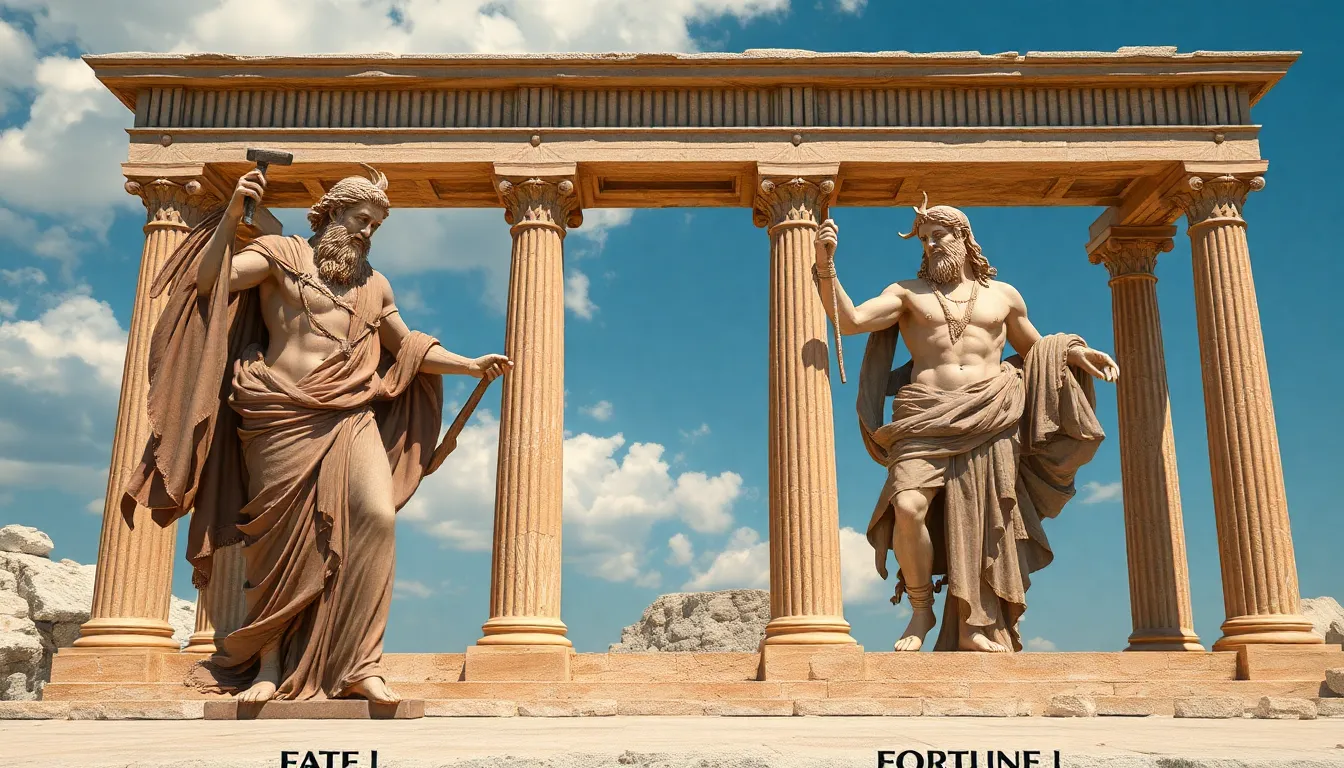Fate and Fortune: Differentiating Between the Two in Greek Mythology
I. Introduction
In Greek mythology, the concepts of Fate and Fortune play pivotal roles in shaping the lives of both mortals and gods. While these terms are often used interchangeably in modern discourse, they represent distinct ideas within the mythological framework. Understanding the nuances of Fate (Moira) and Fortune (Tyche) is essential for anyone interested in the rich tapestry of Greek myths.
This article will delve into the definitions of Fate and Fortune, explore their representations in mythology, and discuss their significance both in ancient times and today. We will examine key myths that illustrate these concepts and analyze character perspectives, cultural significance, and modern interpretations.
II. The Concept of Fate (Moira)
The term “Moira” refers to Fate in Greek mythology, derived from the ancient Greek word for “part” or “portion.” It signifies the predetermined life path each individual must follow, emphasizing the inevitability of destiny.
The Moirai, or the Fates, were three goddesses: Clotho, Lachesis, and Atropos. Clotho spun the thread of life, Lachesis measured its length, and Atropos cut it, determining the moment of death. Together, they embodied the concept that life is governed by a predetermined order beyond individual control.
Key myths that illustrate the power of Fate include:
- Oedipus Rex: This tragic tale showcases how Oedipus’s fate was foretold by the Oracle of Delphi, leading to his tragic downfall despite his efforts to avoid it.
- Achilles’ Choice: In the Iliad, Achilles faces a choice between a long but unremarkable life and a short but glorious one, highlighting the tension between personal desire and predetermined fate.
III. The Concept of Fortune (Tyche)
In contrast to Fate, Fortune (Tyche) represents chance, luck, and the unpredictable nature of life. Tyche was a revered goddess, often depicted with a cornucopia and a wheel, symbolizing the fluctuating nature of fortune.
Tyche’s significance lies in her ability to bestow both blessings and misfortunes upon mortals, illustrating that life is not solely governed by fate but also by the whims of chance. Myths that showcase the unpredictability of Fortune include:
- The Adventures of Odysseus: Odysseus’s journey home is fraught with unpredictable challenges, reflecting the capricious nature of Fortune.
- The Rise and Fall of Croesus: Once considered the richest man in the world, Croesus’s luck turned when he misinterpreted an oracle’s prophecy, showcasing the fickle nature of fortune.
IV. The Interplay Between Fate and Fortune
Fate and Fortune coexist in Greek narratives, often influencing characters in tandem. While Fate sets the overarching path, Fortune can alter the journey, leading to unexpected outcomes.
Examples of characters influenced by both forces include:
- Heracles: Fated to achieve great deeds, Heracles also faced numerous challenges that tested his luck and resilience.
- Persephone: Her fate was sealed as the queen of the underworld, yet her story also reflects the changing seasons and the role of chance in her story.
The philosophical implications of their relationship raise questions about free will and determinism, prompting inquiries into the extent of human agency in the face of greater cosmic forces.
V. Fate vs. Fortune: Character Perspectives
Greek heroes often grappled with their fates, responding in various ways to the challenges posed by their destinies. While some accepted their fates with dignity, others fought against them, leading to tragic outcomes.
The role of Fortune in the lives of mortals is also significant. Many characters experienced drastic shifts in their circumstances based on chance events, highlighting the dual nature of existence in Greek thought.
Case studies of notable characters include:
- Oedipus: His attempts to evade fate ultimately led him to fulfill the prophecy he sought to escape.
- Heracles: Despite his fated greatness, Heracles’s path was often influenced by chance encounters and decisions.
VI. Cultural Significance of Fate and Fortune
The concepts of Fate and Fortune profoundly impacted Greek society and values, shaping their understanding of life, death, and morality. The acceptance of Fate encouraged a sense of humility and respect for the gods and the cosmos.
In literature, art, and philosophy, Fate and Fortune are recurring themes, prompting discussions about human existence and the divine order. Comparisons with other cultures highlight how different societies interpret these concepts:
- Roman Mythology: Similar to Greek beliefs, the Romans also revered the Fates and the goddess Fortuna.
- Eastern Philosophies: Concepts of karma and destiny in Hinduism and Buddhism offer alternative perspectives on fate and fortune.
VII. Modern Interpretations and Relevance
Contemporary society continues to grapple with the ideas of Fate and Fortune, often reflecting on the balance between destiny and personal choice. In literature and film, Greek mythology serves as a rich source of inspiration, influencing narratives that explore themes of fate and the randomness of life.
Lessons from Greek mythology remain relevant today, encouraging introspection about the forces that shape our lives and the extent to which we control our destinies.
VIII. Conclusion
In summary, while Fate and Fortune are intertwined concepts in Greek mythology, they represent different aspects of existence. Fate embodies the predetermined aspects of life, while Fortune encompasses the unpredictable elements that can alter one’s path.
Understanding these distinctions enhances our appreciation of Greek mythology and its enduring relevance. We encourage further exploration of these themes, as they continue to resonate in our understanding of the human experience.




